- Home
- Antonia Fraser
Political Death
Political Death Read online
HIGH PRAISE FOR ANTONIA FRASER
AND
POLITICAL DEATH
“An intelligent tale that is filled with atmosphere.”
—Publishers Weekly
THE CAVALIER CASE
“Antonia Fraser is a wonder, and so is The Cavalier Case.”
—The New York Times Book Review
“Fraser deftly brings together her two previously separate fortes, history and mystery.”
—Publishers Weekly
“[This] bestselling author sleekly weaves all her passions together.… Witty, droll, and a delightful blend of sex, history, scholarship and detection.”
—Kirkus Reviews
YOUR ROYAL HOSTAGE
“A playful romp … Not only is the book hilarious, it’s brilliantly observed and a welcome return to the company of the very smart and likeable Jemima Shore.”
—Cosmopolitan
“Sharp, sophisticated, literate, Your Royal Hostage is a book for those who like their mayhem stylish rather than strident and should appeal to royal watchers and royal knockers alike.”
—Reginald Hill
“Part light-hearted thriller and part mystery, the story is enlivened by sprightly charm, sly wit and mischievous portraits of English eccentrics and American broadcasters.”
—San Francisco Chronicle
A SPLASH OF RED
“Jemima works it out in assertive, often witty style.… Most enjoyable.”
—Houston Chronicle
“A fine story well told.”
—Chattanooga Times
THE WILD ISLAND
“A romantic, tense … satisfying thriller.”
—Publishers Weekly
QUIET AS A NUN
“A judicious mixture of puzzle, excitement and terror.”
—P. D. James
“Fraser holds our interest and leaves us clamoring for more.”
—Publishers Weekly
This edition contains the complete text of the original hardcover edition.
NOT ONE WORD HAS BEEN OMITTED.
POLITICAL DEATH
A Bantam Book
Publishing History
Bantam hardcover edition published March 1996
Bantam paperback edition / February 1997
First published in Great Britain
by William Heinemann Ltd.
All rights reserved.
Copyright © 1994 by Antonia Fraser.
Cover art copyright © 1997 by Tom Hallman.
Library of Congress Catalog Card Number: 95-37779
No part of this book may be reproduced or transmitted in any form or by any means, electronic or mechanical, including photocopying, recording, or by any information storage and retrieval system, without permission in writing from the publisher. For information address: Bantam Books.
ISBN-13: 978-0-553-57203-2
eBook ISBN 978-0-8041-5252-5
Published simultaneously in the United States and Canada
Bantam Books are published by Bantam Books, a division of Bantam Double-day Dell Publishing Group, Inc. Its trademark, consisting of the words “Bantam Books” and the portrayal of a rooster, is Registered in U.S. Patent and Trademark Office and in other countries. Marca Registrada. Bantam Books, 1540 Broadway, New York, New York 10036.
v3.1
NOTE
This story is set in the spring of 1993.
There was, of course, no British General Election
in March of that year, nor a Labour-Liberal Alliance.
All these political happenings, like the politicians
involved in them, are imaginary.
CONTENTS
Cover
Title Page
Copyright
Note
1 A Radical Solution
2 True Confessions
3 Woman’s Whole Existence
4 Anger and Fear
5 Life-threatening
6 “I could have killed her”
7 Ages Ago
8 Family Values
9 In a Dark Place
10 Sleeping Skeleton
11 The Twist
12 What Price Prizes?
13 Passion
14 At the Centre of the Web
15 One of Us
16 Decision Night
17 Strange Rendez-vous
18 Love Conquers All
Other Books by This Author
Dedication
About the Author
CHAPTER 1
A RADICAL SOLUTION
Millie Swain was in her dressing-room reading the evening paper and thinking how rotten the government was, when the telephone rang. With a sinking heart, she knew that it was her sister. Olga was married to a Conservative MP, known to his sister-in-law as Holy Harry, but Millie did not imagine that Olga was calling her to discuss politics. If only she were! Millie would bait her about the government’s record, and how they deserved to lose the election, which would be enjoyable. As it was, Millie Swain was filled with dread.
“She’s done it again. Madre of course. Today of all days. I could kill her. And so could Harry.” Olga’s voice was crisp, but even so Millie could detect the note of resentment towards herself. “Your turn, Millie,” Olga’s voice was saying to her.
“Where?”—defensively—“You know I’m just about to—it’s the last preview—”
“I know. I looked it up in the paper. To get the number.” More resentment. This time the voice was saying: “You haven’t arranged for tickets for us for the first night. And I had to look up your telephone number.”
In the large mirror opposite her chair, Millie could see herself already dressed in the velvet trouser suit and frilly shirt in which she was about to play a sixties Viola. She had grown her short dark hair so that it could be cut to resemble that of a fashionable young man of the period, curls brushing the collar of her shirt. An enormous plastic Pop mackintosh and hat for the opening scene hung on a hook in her open cupboard. She must not let herself be distracted by Olga.
To stop that unspoken voice of complaint, Millie decided on a policy of sisterly warmth. “Where, darling? Yes, it does matter. Perhaps I can help this time. You know I want to. This Twelfth Night is not a long version,” she went on, “many, many cuts, I’m happy to tell you. That means you and Holy Harry—all right, Harry then—will love it, won’t you? It starts at seven thirty. And I can be out of the theatre pretty sharply. At least the West End, if a desert, is a convenient desert.” Millie hesitated. “Olga, you say this time it was worse …”
But could anything be worse than last time, Millie wondered. “Last time” referred to the occasion when Madre had gone to Harrods, bearing an ancient evening dress, shell-pink and heavily beaded, in a Safeways bag. She had then decided to exchange it for a new one on the grounds that there was a stain on it—true enough, there were in fact a good many stains. She must have pulled it out of one of her terrible cupboards. With a kind of dreadful plausibility, the precise dress Madre wanted in exchange—Versace, Christian Lacroix, that sort of thing, costing thousands—had similar bead-work to the remnants on the ragged pink object on the chair beside her.
“Actually it did have a very dirty label in it, something like ‘Christian Dior–Harrods’,” reported Olga. “No doubt that was what aroused the manager’s respect.” It was naturally Olga who’d had to cope with all this. (Millie was in rehearsal and could not be reached.) Olga found herself summoned to Harrods by a house manager or some such functionary who was, under the circumstances, amazingly polite. Perhaps that was part of the Harrods’ training course: how to pacify middle-aged ladies bringing in ancient dresses to exchange them for something new?
“Lady Imogen was rather distressed,” he began, “but fortunat
ely she had your number written in her diary under the words ‘Next of kin’.” The manager coughed discreetly at what such a phrase might otherwise suggest. “So it seemed wise to summon you.”
Olga tried to match the manager’s own delicacy. “I’m afraid my mother does get a little distressed from time to time. Confused is probably the right word.” Olga thought she had better broach the unpleasant subject. “Did she by any chance try to pay for the dress by putting it on her account?”
“I don’t think you quite understand.” The first hint of something less bland beneath the manager’s composed surface. “Lady Imogen didn’t try to pay for it at all—”
“Yes, yes,” stumbled Olga, “how stupid of me.” Just as well, she thought, since the account had long ago been closed: one of the many facts her mother found impossible to accept.
“As a matter of fact Lady Imogen seemed to think that the original dress had been a present,” went on the manager with a tactful cough, blandness restored. But Olga knew better than to pursue that one. She knew from experience that this could be lethal. She could imagine only too well who was supposed to have given her mother the dress, probably had given it to her, dammit.
“Come along, Madre,” Olga said bracingly—but not too bracingly, she hoped. Past experience again: too much bossiness, the nanny’s touch, tended to make things worse. “Let’s go home.”
“But my pretty dress.” Lady Imogen spoke up suddenly in that breathy little-girl voice which became that much breathier on these occasions. “I need it for tonight. The Barracloughs’ ball. Teresa is coming up from the country. As you can imagine, rather a fraught occasion. But Burgo has promised, you know, my Burgo—” More coughs but this time from Olga, as she resolutely interrupted her mother. She simply could not allow Madre to keep introducing that name. It was so terribly recognisable! The manager sounded nice and was certainly helpful, but the Press were everywhere. With the election coming (it had finally been announced for March 18) politicians were more in the news than ever, and if the story got repeated … what on earth would poor Harry do about it?
Her mother was sitting quite docilely on a gilt chair brought by the thoughtful manager; she had the unhappy air of an abandoned child. It was indeed extremely irritating to Olga that her mother, a woman in her sixties, for heaven’s sake, could from a distance be mistaken for a girl. It was partly the sheer littleness of her. Imogen Swain was no more than five foot one, a tiny fairy of a woman, and even the absurd high heels she insisted on wearing, on which she balanced so precariously, hardly took her to average height. Both Olga and Millie had inherited the more robust physical appearance of the father they could not remember.
Of course when you saw Madre close, no slimness could make up for the fact that here was a wrinkled, no, an extremely wrinkled woman, who would never see sixty again—might indeed be seeing seventy quite soon. The huge blue eyes (Olga and Millie both had eyes like black olives) were surrounded by lines, which the spiky mascara on the sparse eyelashes only emphasised, and lines dragged down the wide mouth with its slightly-too-bright lipstick. Raddled was probably the right word for Madre’s appearance. Olga’s daughter Elfi, an only child with an unfortunate gift for accuracy, had once observed, “Nonna looks like a very old doll, doesn’t she, like a doll you find in the garden when it’s been left out in the rain?” It was still true that neither Olga nor Millie could be mistaken for dolls.
Now, as Millie Swain sat in her dressing-room in her velvet suit, waiting for the latest report from the distressing maternal front, her gaze fell again on the evening paper. It would happen that there was a picture of the Right Honourable Burgo Smyth at Heathrow beneath a report of the latest poll on the outcome of the election (still a dead-heat). That in itself was hardly unusual: a Foreign Secretary was always at some airport or other, BURGO FLIES OUT was a familiar headline as the photogenic Foreign Secretary headed towards the latest crisis. In this case Burgo was flying in: he was calling, she noted, for a radical solution to something or other, some place or other. Millie had long ago trained herself not to tremble with agitation every time she saw a picture of Burgo or caught sight of him on TV. But this afternoon’s picture was different.
By a fluke of shadow as he bent down, Burgo’s magnificent head of silvery hair—his most characteristic feature—looked black again. This was once more the young man who—but Millie would not let herself continue. She had to think of Madre now, not Madre then, not Burgo at all. For a long time as children they had not been allowed to mention his name. The topic had been cut off, just like that, with bewildering suddenness. In the same way Burgo himself—marvellous generous teasing huggable bear-like Burgo—had vanished mysteriously and suddenly from their lives. Questions to Madre had met with a blank stare of those huge wide-open blue eyes, so famously beautiful, so free from lines around them. And there would be silence as though the question had simply not been asked. Questions to Nanny Forrester had met with a sharp reproof and, if repeated, a sharp slap. So Millie had learnt to divorce the public image of Burgo Smyth, politician, from the private man she had once known. Most of the time she genuinely felt nothing.
Millie in the theatre firmly turned the paper over: “Go on, Olga, tell me all,” she said encouragingly.
“It was worse this time. Worse than Harrods, the rest of it.” A significant pause. “Madre went to the house in Westminster Place.”
“Christ!” Millie sat up, reached for the paper and instinctively started to crumple it, as though to obliterate the handsome threatening image. Then she relaxed. “But surely he wasn’t there. I mean, he’s been in Turkey, according to the paper, but in any case I read somewhere that he finally sold the house. If only Madre had done the same! Anyway, doesn’t the Foreign Secretary have a residence? Which we of course pay for. Ridiculous and unnecessary extravagance,” Millie couldn’t help adding.
But Olga did not rise. She allowed herself the luxury of quarrelling with Millie about politics only on occasions (like family Christmas) which could do with a little heightened blood pressure. This was not one of them.
“No, he wasn’t there. But someone was. Someone who took Madre in, someone who found the ‘Next of Kin’ note in her Asprey’s diary—one day, Millie, don’t you think that you might …? Especially when Harry really needs my help, with his tiny majority. Ah well, perhaps not, the Bohemian life and all that—as I was saying, someone who telephoned me. Someone who got me just as I was going to see Elfi in her school play. ‘Your mother seems rather confused.’ The usual story.”
“Olga, please. I’m on stage in twenty minutes. I know it’s dreadful you had to cope once again. But for God’s sake, who?”
“Mack McGee, that’s who. He’s bought the house, it seems. And Mrs. Mack McGee. A nice woman, by the way. Madre was sitting with them both when I got there. Sipping tea and telling them all about it.”
“All about it?” asked Millie faintly. “Wait, tell me first, what happened about Elfi?”
“I rang Harry’s secretary at the House and she found Harry in the constituency. So he went. In spite of his commitments. He’s very good in that way.” Millie did not comment. Holy, Holy Harry, she thought.
“And being your daughter—,” continued Olga (it was an old joke between them and signified that Olga had, for the time being, forgiven Millie), “as your daughter, she screamed and had hysterics at my non-arrival offstage, and then gave a brilliant performance.”
“OK. Now for the bad news.”
“It’s pretty bad, I’m afraid, Millie.”
“Surely the McGees must have known? It must have been pretty well known at the time. Think of the McGee Group and its papers. Surely people knew about things like that, even if they couldn’t print things the way they do now.”
“I’m afraid Mr. and Mrs. Mack McGee were still in Aberdeen in those distant days. If they did own papers, they were respectable Scottish ones. But, Millie, they surely do know now. You see, Madre had another of her famous Safeways bags with her. O
nly this time, instead of a grungy dress it contained one of her Diaries. And she was reading from it when I arrived. Luckily, it seemed to be about some dreary round of fifties parties rather than anything worse. In between sips of tea.”
There was a short silence. Millie broke it. “That’s it,” she said briskly. “This time there’s got to be what’s known as a radical solution. I’ll come round after the theatre. I’ll get a taxi. Can you be there? What about Elfi? Au pair? Babysitter? Or will Holy—will Harry be back?”
“One or the other. For obvious reasons, Harry will do anything—” Olga wanted to say, “This is pretty embarrassing for him too, an MP and the same party too and all that,” but she did not want to test Millie further, given that her sister was officially on record as being fond of her: brother-in-law (in spite of his politics). Even that stupid nickname, Holy Harry, could be seen as a tribute to his many selfless good works. The important thing was that the sisters were united again, as they had been throughout their forlorn and baffling childhood.
After Olga rang off, Millie continued to sit in her chair opposite the velvet-trousered image in the mirror until the theatre tannoy interrupted her thoughts. The voice of Hattie Vickers, the stage manager, called: “Act One, beginners please, Mr. Birley …” Normally Millie listened with amusement to the slight quiver in Hattie’s voice when she pronounced the name of her beloved—at least Millie told Randall Birley that she heard a quiver. Tonight her thoughts were far away from Hattie and even from Randall. It was a measure of Millie’s distraction that although she had been acting with Randall Birley for five months now, and they had been lovers for most of that time, she still thought she heard Hattie say “Mr. Burgo …”
She had promised Olga, promised herself, a radical solution. Should she call him, should she warn Burgo? And if the answer was yes, warn him against what? Surely Madre, having been silent for so long, could not seriously be thinking of going public now? Or could she? What could age, and let’s face it, drink and loneliness, do to you …? Millie sighed. Time to get ready. She cleared her throat.

 Warrior Queens
Warrior Queens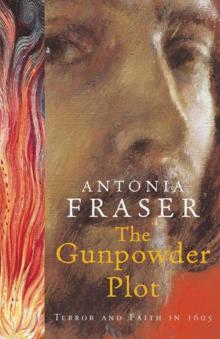 The Gunpowder Plot
The Gunpowder Plot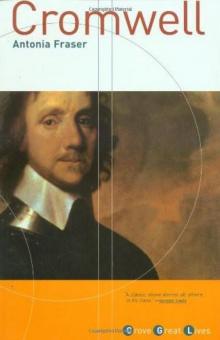 Cromwell
Cromwell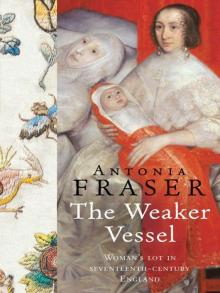 The Weaker Vessel: Women's Lot in Seventeenth-Century England
The Weaker Vessel: Women's Lot in Seventeenth-Century England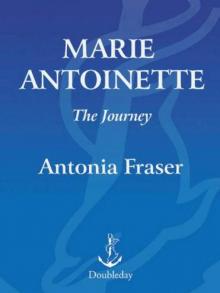 Marie Antoinette: The Journey
Marie Antoinette: The Journey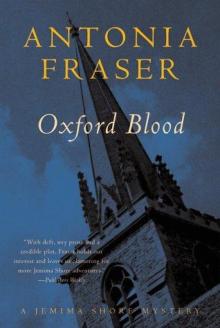 Oxford Blood
Oxford Blood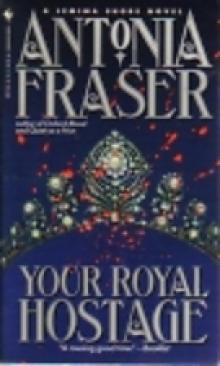 Your Royal Hostage
Your Royal Hostage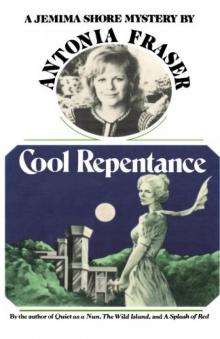 Cool Repentance
Cool Repentance Mary Queen of Scots
Mary Queen of Scots Political Death
Political Death Royal Charles: Charles II and the Restoration
Royal Charles: Charles II and the Restoration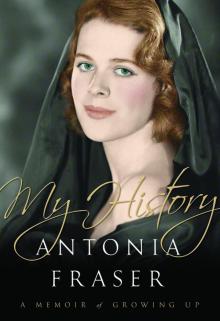 My History: A Memoir of Growing Up
My History: A Memoir of Growing Up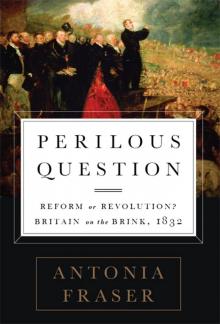 Perilous Question: Reform or Revolution? Britain on the Brink, 1832
Perilous Question: Reform or Revolution? Britain on the Brink, 1832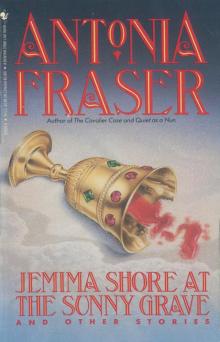 Jemima Shore at the Sunny Grave
Jemima Shore at the Sunny Grave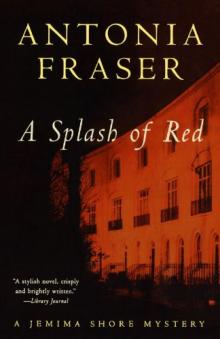 A Splash of Red
A Splash of Red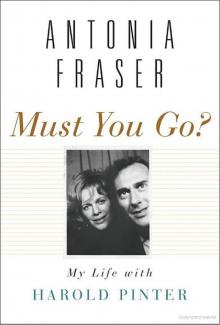 Must You Go?: My Life With Harold Pinter
Must You Go?: My Life With Harold Pinter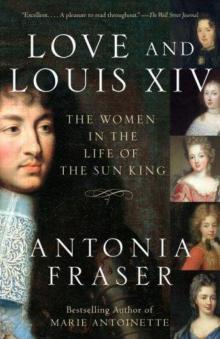 Love and Louis XIV: The Women in the Life of the Sun King
Love and Louis XIV: The Women in the Life of the Sun King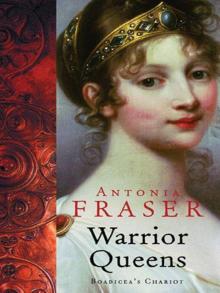 The Warrior Queens
The Warrior Queens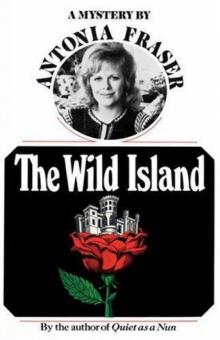 The Wild Island
The Wild Island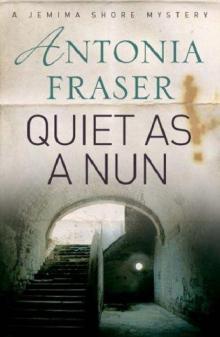 Quiet as a Nun
Quiet as a Nun Perilous Question
Perilous Question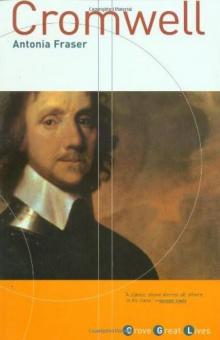 Cromwell, the Lord Protector
Cromwell, the Lord Protector Gunpowder Plots
Gunpowder Plots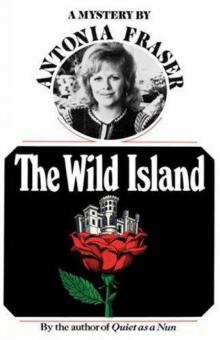 The Wild Island - Jemima Shore 02
The Wild Island - Jemima Shore 02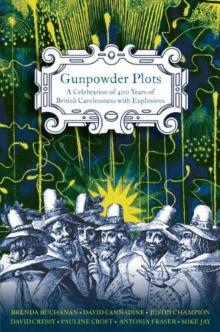 Gunpowder Plots: A Celebration of 400 Years of Bonfire Night
Gunpowder Plots: A Celebration of 400 Years of Bonfire Night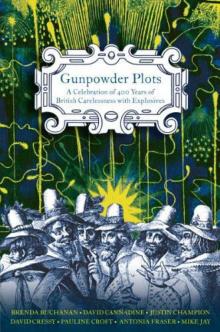 Gunpowder Plots_A Celebration of 400 Years of Bonfire Night
Gunpowder Plots_A Celebration of 400 Years of Bonfire Night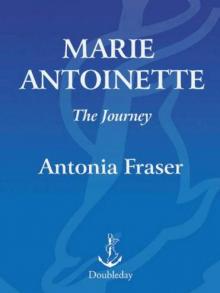 Marie Antoinette
Marie Antoinette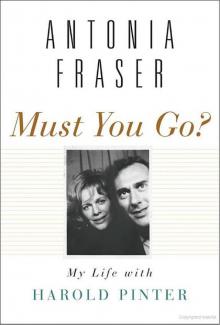 Must You Go?
Must You Go?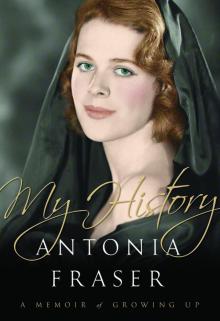 My History
My History